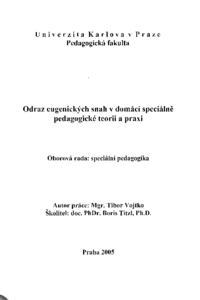Odraz eugenických snah v domácí i speciálně pedagogické teorii a praxi
Eugenic efforts presentations in special education theory and practice on internal level.
rigorózní práce (UZNÁNO)

Trvalý odkaz
http://hdl.handle.net/20.500.11956/2733Identifikátory
SIS: 148927
Katalog UK: 990019366750106986
Kolekce
- Kvalifikační práce [20493]
Autor
Fakulta / součást
Pedagogická fakulta
Obor
Speciální pedagogika
Katedra / ústav / klinika
Katedra speciální pedagogiky
Datum obhajoby
20. 2. 2006
Nakladatel
Univerzita Karlova, Pedagogická fakultaJazyk
Čeština
Známka
Uznáno
Předložená doktorská práce se zabývá otázkou vlivu a dopadu českého eugenického hnutí na pomocné školství, ústavní péči a všeobecně dobově podmíněné postoje k postiženému člověku v první polovině 20. století v Československu. Výzkum si klade za cíl přispět k teoretickému poznání vztahu vývojových stadií mechanismů dědičnosti a genetiky a speciální péče o člověka s postižením na přelomu 19. a 20. století a v meziválečného Československa. Text je rozdělen do třech částí. Cílem úvodní části je vymezení eugeniky jako svébytného exaktního oboru. Nedílnou součástí vstupního výzkumu je rozbor tří základních faktorů, které eugeniku postulovaly: společensko kulturní diskurz o domnělé degeneraci člověka a úpadku lidské společnosti tzv. civilizovaných států Evropy a Ameriky, dále vývoj evoluční biologie a dědičnosti, resp. genetiky. Druhá část textu prezentuje výsledky výzkumu základních myšlenkových směrů českého eugenického hnutí od r. 1900 do r. 1948. Uvedení představitelé české eugeniky jsou chronologicky seřazeni a představují vůdčí osobnosti dobového diskurzu. Cílem druhé části je především deskripce vztahu eugenického výzkumu patologických, geneticky podmíněných jevů a výchovy, vzdělávání a sociální péče o člověka s postižením. Powered by TCPDF (www.tcpdf.org)
The thesis The Reflection of Eugenic attempts in Local Special Pedagogical Theory and Practice deals with the impact of Czech eugenic movement on forming of special schooling, institutional care and generally conditioning attitudes towards disabled people at the turn of the I9lh and 20th centuries-and in the first half of 20th century in Czechoslovakia. The target of the work is to explain the interrelation of the eugenic research of pathological genetically conditioned defects and the development of special care of a disabled person. The introductory part of the text is concentrated on the definition of the scientific field which is the eugenics and the classical eugenism. The research is inspired by the eugenics of Francis Galton (1822-191 I) the English scientist who qualified the eugenics as a relevant scientific discipline which studies social factors which either make better or make worse gender characteristics of next generations of a human being. Eugenics came out of the synthesis of three ways of recognizing: a presumed idea about biological degeneration of people and social and cultural failure of a human society, Darwin's theory of natural selection as a universal mechanism of evolution and revealing of essential rules of heredity and development of modern Mendel's genetics after the year 1900....
